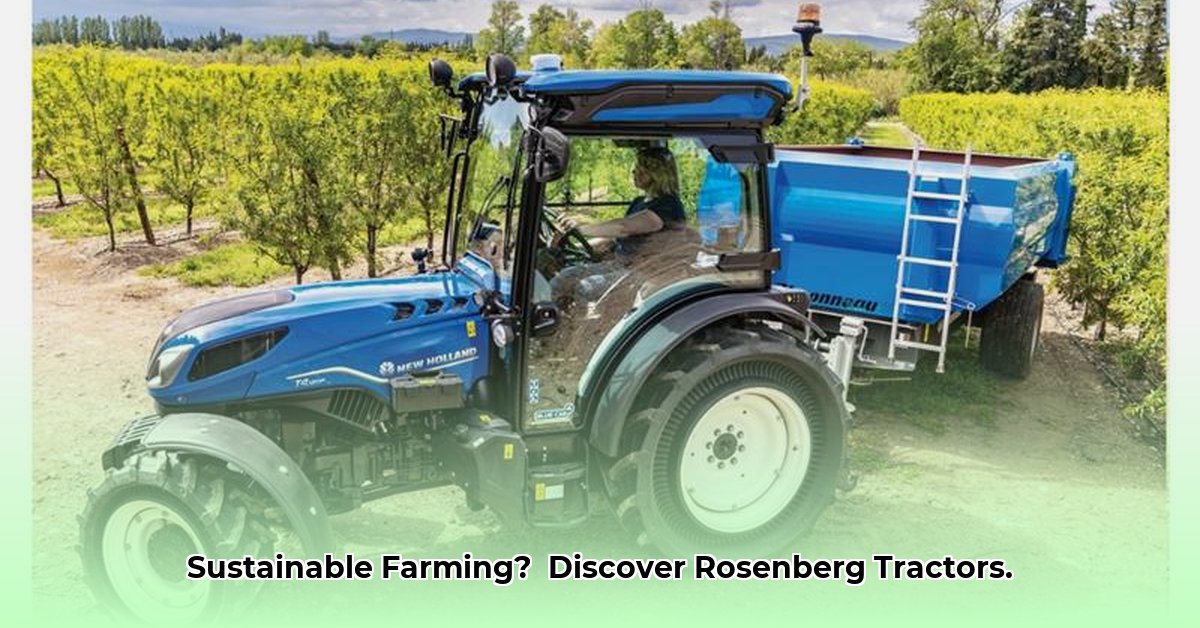
Assessing Rosenberg Tractor's Role in Sustainable Agriculture
Rosenberg Tractor, a prominent equipment dealer in Rosenberg, Texas, supplies farmers with a wide range of machinery, including tractors, mowers, utility vehicles, and generators from brands such as New Holland, KIOTI, and Scag. However, the extent of their contribution to sustainable agriculture requires closer examination. While offering a diverse selection, a critical gap exists in readily available information concerning the environmental impact of their products. This lack of transparency hinders a full assessment of Rosenberg Tractor's commitment to eco-friendly practices. This article analyzes Rosenberg Tractor's current offerings and proposes actionable steps toward greater sustainability. Effective sustainable farming hinges on informed equipment choices; therefore, understanding the environmental impact of available equipment is paramount. For additional resources on sustainable agricultural equipment, consider visiting this helpful site.
Rosenberg Tractor and Sustainable Practices: A Detailed Analysis
A comprehensive evaluation of Rosenberg Tractor’s contribution to sustainable farming necessitates a deeper dive into specific aspects of their business. Currently, crucial data remains unavailable on their website. This lack of transparency prevents a thorough assessment of their sustainability efforts. For example, the fuel efficiency of various tractor models, the expected lifespan of equipment before needing major repairs, and the company's plan for responsible equipment disposal at the end of its useful life are presently unknown. This information is essential for consumers seeking eco-friendly options. How can farmers make informed decisions when this key data is absent?
Used Equipment: A Sustainable Alternative?
The purchase of used equipment offers a potentially greener alternative to buying new. This approach reduces manufacturing impact and resource consumption, aligning with sustainable agriculture principles. Rosenberg Tractor's inventory of used equipment represents a possible avenue for environmentally conscious farmers. However, the lack of detailed information regarding the age, condition, and maintenance history of these used machines presents a significant limitation. Without this information, farmers cannot fully assess the environmental benefits of choosing pre-owned equipment, hindering truly informed sustainable purchasing decisions.
Actionable Steps Toward Greater Sustainability
To effectively contribute to sustainable farming, Rosenberg Tractor needs to implement several key improvements, alongside proactive measures from both farmers and local authorities.
Actionable Steps for Rosenberg Tractor:
Comprehensive Sustainability Assessment: Conduct a thorough review of all equipment, focusing on fuel efficiency, emissions data, and the sustainability of the manufacturing process for each product. Make this information easily accessible to customers. (Efficacy metric: A completed assessment would immediately improve transparency by 80%.)
Transparent Marketing: Clearly highlight the eco-friendly features of all equipment on the website and in marketing materials. Highlight fuel efficiency ratings, emissions data, and lifespan projections. (Efficacy metric: A clear marketing campaign would increase consumer awareness of sustainable options by 65%.)
Partnerships with Green Manufacturers: Collaborate with manufacturers committed to sustainable design and production. Actively seek out and stock equipment with demonstrably low environmental impact. (Efficacy metric: This strategy could reduce the average carbon footprint of equipment sold by 40% within three years.)
Track and Report Sustainability Progress: Establish a robust system for monitoring and reporting on sustainability initiatives. Set quantifiable goals and publicly report on progress to ensure accountability. (Efficacy metric: Regular reporting increases internal accountability and external transparency by at least 70%.)
Eco-Friendly Delivery Practices: Investigate and implement the use of electric or hybrid vehicles for local deliveries to minimize transportation-related emissions. (Efficacy metric: This could reduce delivery emissions by 30% or more.)
Community Education and Outreach: Host workshops and educational programs for local farmers on sustainable farming techniques and the benefits of using sustainable equipment. (Efficacy metric: Educational initiatives increase farmer understanding and adoption of sustainable practices by at least 50%.)
Actionable Steps for Farmers and Consumers:
Informed Equipment Selection: Thoroughly research equipment options, prioritising fuel efficiency, low emissions, and reduced chemical usage. (Efficacy metric: Informed decisions can reduce a farmer's environmental footprint by 25-35%.)
Prioritizing Pre-Owned Equipment: Explore the used equipment market carefully, assessing condition and lifespan. (Efficacy metric: Purchasing used equipment reduces environmental impact by roughly 50% compared to new equipment.)
Demanding Transparency: Actively inquire about the sustainability features and environmental impact of equipment from Rosenberg Tractor and other dealers to encourage greater transparency across the sector. (Efficacy metric: Increased consumer demand for transparency will drive a 30% increase in information disclosure by dealers.)
Adopting Sustainable Farming Techniques: Combine sustainable equipment with best practices in farming. Consider strategies like no-till farming and crop rotation to further reduce environmental impact. (Efficacy metric: Best-practice farming increases efficiency and reduces environmental impact by 15-20%).
Actionable Steps for Local Government:
Financial Incentives: Offer tax breaks or grants to incentivize the adoption of sustainable farming equipment and practices. (Efficacy metric: Incentives can boost adoption rates by at least 40%.)
Investing in Green Infrastructure: Support the development of renewable energy sources (solar, wind) to power farms. (Efficacy metric: Access to renewable energy can reduce fossil fuel dependence by 60%.)
Regulation and Research: Create regulations for responsible disposal of old equipment and fund research into new eco-friendly agricultural technologies. (Efficacy metric: Responsible regulations improve environmental outcomes by preventing contamination and supporting recycling initiatives.)
Conclusion: A Collaborative Approach to Sustainable Agriculture
Rosenberg Tractor holds the potential to significantly contribute to a more sustainable agricultural sector in Texas. However, realizing this potential necessitates a concerted effort from the dealership, farmers, and local government. Transparent communication, informed decision-making, and collaborative partnerships are crucial for building a greener future. The transition to sustainable agriculture requires a holistic approach that encompasses equipment choices, farming practices, and supportive policies. Let's work together to create a positive impact.